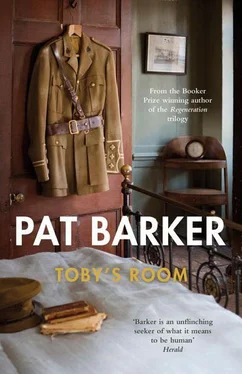The midges were a nuisance, particularly near the pond where there was a punt tethered — all rather romantic. And of course I went off into a daydream, bending over the water, as if I were going to kiss my own reflection — and judging from the glimpse I had of the conscientious young men at tea I think I may have to. There was a shoal of fish, quite small, striped green and gold, very pretty, until you looked more closely and saw their malevolent grins.
When I looked up again, I’d been joined by two entirely naked young boys. The elder — about twelve, I suppose — had that finished look of late childhood, confident, even arrogant, a little prince in his wild kingdom. The other was still soft and round and vulnerable. They were employed in blowing up toads. Apparently you insert a straw into their rear ends and blow and — Well! I just refuse to think about it.
Over dinner we talked about the war. What the men will do in winter when work on the land isn’t needed, though they’ll still have to do something, work in a factory or a hospital, I suppose. The boys didn’t appear, though through the open windows you could hear them fighting a battle of some sort, lots of blood-curdling yells and screams; and inside there were the adults being so seriously, conscientiously, determinedly opposed to it all. But it’s the little wild savages in the garden who’ll win, I think.
Now I’m sitting in my bedroom listening to an owl hooting and wishing I could talk to Toby. Or Paul. Paul’s in hospital in London, badly wounded, and I haven’t even been to see him yet, so what does it mean when I say I want to talk to him? It’s not even a conscious decision, not going to see him; I mean, I just can’t seem to make myself do it. Ever since he volunteered to fight, we’ve been drifting further and further apart. Sometimes I wonder if there’ll be anything left when we do, finally, meet. And then I feel terrible because while he was out there I virtually stopped writing to him altogether. Just couldn’t do it any more, couldn’t bear to spin out the trivialities of my life. And now there he is in hospital with a lump of shrapnel in his leg — though I suppose they’ll have got that out by now — and here I sit in a cosy little bedroom in a borrowed nightie, and … And none of it is my fault.
And yet there’s so much guilt: always another letter needing to be written. And when you do write you can’t say any of the things you want to say — I can’t, anyway — because it might be the last thing they read. So you have to be nice, you have to be cheerful, you haven’t to mention anything that might upset them. It’s horrible for them, but it’s horrible for us as well.
Only it can’t be just that; I mean, the reason I stopped writing to Paul, because all that applies to Toby too, and I write to him twice a week.
4 August 1917
I think my heyday’s over. This came to me very clearly walking in the garden this morning after breakfast. Everybody else had gone off to work, or almost everybody. The boys had vanished, but I could feel them tracking me. I think all visitors are German spies in their eyes, needing to be watched. You hear them rather than see them, a twig cracking or the rustling of a leaf. Anyway, there I was, ‘alone’ in the garden, thinking, I’m past my prime.
Oh, what nonsense, Catherine would say. At least I hope she would! I’ve lost touch with all my other Slade friends, so I don’t suppose they’d have an opinion. No, my best time was at the Slade before the war, I was happy then. Pursued by men, especially after I cut my hair off. (So much for Mother’s fears that I’d become a nun.) And let’s face it, being pursued is always rather nice, however little one may wish to be caught.
And then I saw Michael Stoddart, one of the conscientiously objecting young men, standing by the pond smoking a cigarette, so I went up to him, suggested a walk through the fields, and off we went.
Intolerable heat, really intolerable. Generally there’s a breeze on the Downs, so you know you’re going to be cool up there, however hot it is elsewhere, but these last few days even the breeze has been hot. Something very un-English about it — the Sirocco, one of those peculiar winds I used to know the names of, which are supposed to drive people mad. So anyway, we walked and observed an aeroplane flying over us towards the coast, and countless butterflies. It’s been a fantastic year for butterflies, silver fritillaries, peacocks, blues — clouds of blues — but the conversation limped along. I did my Jane Austen-ish best with the weather — how strange it’s been, so hot and dry in Kent, absolutely pouring down everywhere else — and the farmhouse, how beautiful it is, and the very convenient ease of the train journey from London, I almost asked after the health of his family, but then I thought, No, for goodness’ sake, I haven’t met them. Your turn. And to give him his due, he did his best .
Him. Tall, lean, floppy blond hair, blue eyes — very striking at the moment because he’s suntanned from all that working on the farm — slightly stuttering speech, a rather modest, self-deprecating air, which I always think conceals arrogance, but then I’m getting cynical in my old age .
We carried on walking across the fields. The heat of the sun seemed to have contracted to a single point that was boring into my head like a bottle opener being screwed into a cork. Great blasts of hot wind coming off the Downs — a furnace door opening and shutting. He didn’t say much, just glanced at me sidelong now and then. I think girls must be a rarity in his life because he certainly seemed to think I was some kind of exotic creature. He asked about my painting, and obviously expected me to ask about his, but I hadn’t heard of him, so I didn’t, and then he asked if I had anybody Out There. So of course I told him about Toby and Kit Neville, and the others. Sometimes it seems as if every young man I’ve ever known is in France. (Or under it.) I could see him waiting for me to ask why he wasn’t Out There too, but I didn’t. I never do. When he pushed, I said it didn’t concern me. As a woman, it didn’t concern me. To be honest, I was copying something I’d heard Mrs Woolf say last night after dinner, about how women are outside the political process and therefore the war’s got nothing to do with them. It sounded clever when she said it, and stupid when I repeated it. And immediately I started thinking about women in Deptford hurling bricks through the windows of ‘German’ shopkeepers — they aren’t German, they’re Polish or Russian or something, but the name’s foreign and that’s enough — and about the girls who handed white feathers to Toby when he was called back to London to complete his studies. All the medical students got white feathers, that’s why in the end they had to let them wear army uniform. And I thought, No, it’s not true, women aren’t more peaceful than men. It pains me to say it, but the one thing this war has shown conclusively is how amazingly and repulsively belligerent women are . Some women .
Anyway, he didn’t have the temerity to disagree with me. No doubt Mrs W’s views are sacrosanct.
We were walking down a lane between two fields. In the one on the right German prisoners were cutting the corn with hooks, guarded by a soldier with a gun, though he was cradling it in his arms like a baby and seemed half asleep. The prisoners were joking and laughing as they worked, though they looked up as we walked past. Further on was a field reduced to its last stand of corn, the grain heads heaving and turbulent with the wild life trapped inside. With every turn of the harvester the cutting blades moved nearer. We stopped to watch. Men like charred sticks stood around — I mean, they were black against the burning gold of the field — everything seemed to be on the point of bursting into flame, like one of Van Gogh’s landscapes, and the air burnt the back of your throat. Dogs leaping up and down on the end of their leashes like black scribbles on the air. Then first one rabbit broke cover, then another, and another. Almost leisurely it seemed, the guns were raised, one smooth fluid movement, and a rabbit leapt off the stubble, fell, ran on again, limping and falling, until a second shot put an end to it. It lay there twitching for a few seconds, then went still, a bundle of dusty fur, looking suddenly much smaller than it had in life.
Читать дальше












